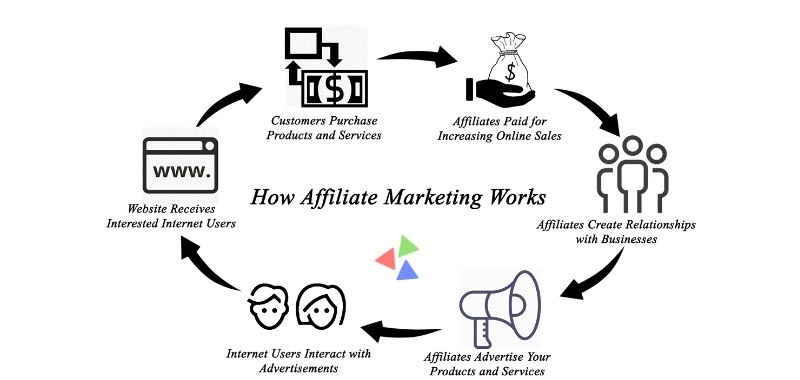
Get ready to explore the exciting world of affiliate marketing! Whether you are new to the game or a seasoned pro, this comprehensive guide “How to Start an Affiliate Marketing Business for Beginners” will provide you with the information you need to succeed.
In this “LONG” guide, we will cover the basics of affiliate marketing, the most effective strategies for driving traffic and sales, the top affiliate marketing programs and networks to join, and the most useful resources and news sources to stay up-to-date on the latest trends.
So .. let’s dive in and discover how you can start earning passive income through affiliate marketing!
IMPORTANT: For those who are new to affiliate marketing and looking to establish a profitable and sustainable business, we have put together a comprehensive article. It contains valuable and essential information that you need to know. Before advancing to the expert level, it’s crucial to grasp these basics thoroughly.
DON’T JUMP! YOU NEED TO COMPLETE IT STEP BY STEP.
“A strong foundation is the key to a sturdy and reliable house.”
What is Affiliate Marketing?
Let’s start by discussing what affiliate marketing is and why it’s such a popular and profitable business model today.

“Affiliate marketing” is a type of performance-based marketing where you earn a commission by promoting other people’s products or services. As an affiliate marketer, you act as a middleman between the customer and the product or service owner. When someone clicks on your affiliate link and makes a purchase, you earn a commission.
EXACTLY! .. It is one of the best “commission-based marketing businesses” out there.
Why is Affiliate Marketing a Great Business Model?
There are many reasons why affiliate marketing is a great business model .. including:
- Low Start-Up Costs: You don’t need to create your own products or services, so the start-up costs are low.
- No Inventory: You don’t need to hold any inventory, which saves you money and space.
- Flexibility: You can work from anywhere in the world and choose the products or services that you want to promote.
- Long-Term Profits: Once you have built up a loyal following, you can continue to earn commissions from the same customers over time.
- Passive Income: You can earn money while you sleep, as long as your website is generating traffic and your affiliate links are working.
Start your affiliate marketing business today and take advantage of these benefits. With the right mindset, strategy, and effort, you can build a profitable and sustainable business that gives you the freedom and flexibility you crave.
So, what are you waiting for?
How Do I Start an Affiliate Marketing Business?
Don’t worry! .. If you’re interested in starting with affiliate marketing, we’re here to help you get started! Here are some key steps you’ll need to take to build a successful affiliate marketing business.
- Choose Your Niche: What do you love? .. Select a niche that you’re passionate about or knowledgeable in, and one that has good profit potential. This is the most important thing to start.
- Find Affiliate Networks or Programs: Search for affiliate networks or programs that offer products or services related to your niche.
- Set Up a Website: Create a website or blog where you can promote these products or services. To be in this business, you must have your own home.
- Create Quality Content: Make your business stay fresh .. Produce high-quality content that is relevant to your niche and provides value to your audience.
- Promote Your Website: Spread the word about your website through various channels such as social media, email marketing, or paid advertising.
- Track and Analyze Results: Use analytics tools to track your website traffic and sales, and analyze your results to see what’s working and what’s not. Do it from time to time.
- Scale Your Business: Not now, but in the future! Once you’ve found success in your initial niche, .. consider expanding into new niches or promoting more products within your existing niche.
- Use Tools and Resources: Make use of affiliate marketing tools and resources such as affiliate networks, affiliate tracking software, and analytics tools.
- Stay Up-to-Date: Be at the front of the line .. Stay current with marketing trends and news to ensure that you’re always ahead of the curve and able to adapt to changes in the industry.
At this point, affiliate marketing can be a highly profitable and rewarding business model if done correctly. By following these steps, you can establish a successful affiliate marketing business and generate passive income over the long term.
Remember: .. Always choose a niche that you’re passionate about, create quality content, and stay up-to-date with the latest marketing trends and news. With perseverance and dedication, you can achieve great success in the world of affiliate marketing.
For more useful and practical details, please check out the next section.
The First Step: Choosing Your Niche

Niche, Nicher, or Nichest! .. The first step in building a successful affiliate marketing business is to choose the right niche. Now, we’ll walk you through the importance of niche selection and how to find a profitable niche that will set you up for success.
“The first step towards success is often the hardest, but the most important.“
General vs Niche
General topics are broad and cover a wide range of subjects, while niches are specific and focused on a particular area. Here are some differences between general topics and niches:
- Scope: General topics cover a broad range of subjects, while niches are much narrower and more specific.
- Audience: General topics appeal to a wide range of people, while niches appeal to a specific group of people who share a common interest.
- Competition: General topics tend to have a lot of competition, while niches are often less competitive, making it easier to stand out and become an authority in your field.
- Expertise: It’s challenging to become an expert in a general topic due to the vast amount of information and competition, while niches allow you to become an expert in a particular area, allowing you to build a loyal following.
- Monetization: General topics can be difficult to monetize due to the high competition, while niches often have more opportunities for monetization through affiliate marketing, sponsored content, and product sales.
While general topics have their advantages, focusing on a niche can help you stand out, build a loyal audience, and become an expert in your field, making it easier to monetize your business.
Why Must You Choose a Niche?
IMPORTANT! Choosing the right niche is critical for the success of your affiliate marketing business. Here are some reasons why:
- It helps you focus your efforts: By selecting a niche, you can concentrate your efforts on promoting products that are relevant to your audience, making it easier to attract potential customers.
- It allows you to stand out: By focusing on a specific niche, you can differentiate yourself from other affiliates and become an authority in your field.
- It helps you build a loyal audience: By catering to the needs and interests of a specific group of people, you can build a loyal following of customers who trust your recommendations.
Where to Find a Profitable Affiliate Marketing Niche
Now that you understand the importance of niche selection, let’s take a look at how you can find a profitable niche. IT TAKES TIME!
- Identify your interests and passions: Start by making a list of topics that you are passionate about or have an interest in. This .. will help you choose a niche that you enjoy working in and are knowledgeable about.
- Research affiliate programs: Look for affiliate programs in your chosen niche and assess the commission rates, payment terms, and other important details.
- Analyze competition and demand: Use tools like Google Trends, SEMrush, Ahrefs, and more .. to determine the level of demand and competition in your chosen niche.
- Evaluate profitability: Look for products in your niche with a high profit margin, and determine the potential earnings per sale.
Examples of the Niche
Below are some examples of niche topics in various areas:
- Vegan meal prep: This niche focuses on providing meal prep ideas and recipes for individuals following a vegan diet.
- Baby sleep training: This niche provides tips and strategies for parents looking to help their baby sleep through the night.
- DIY woodworking: This niche provides tutorials, plans, and product reviews for individuals interested in woodworking as a hobby.
- CrossFit training for women: This niche focuses on providing workout plans and nutrition tips specifically tailored to women who practice CrossFit.
- Minimalist living: This niche focuses on providing tips and advice on how to simplify your life and live with fewer possessions.
- and much more ..
Niche Keyword Tools (FREE and PAID)
Today, there are several efficient tools you can use to find a profitable affiliate marketing niche. Here are some examples:
- Google Keyword Planner: This tool allows you to research keywords related to your niche and see their search volume and competition level.
- Google Trends: This tool shows you the popularity of a particular keyword over time and can help you identify trending niches.
- Amazon Best Sellers: By looking at the top-selling products in a particular category on Amazon, you can identify profitable niches.
- ClickBank Marketplace: ClickBank is an affiliate marketing network that specializes in digital products. By browsing their marketplace, you can identify profitable niches.
- Ahrefs: Ahrefs is a comprehensive SEO tool that can help you research keywords, analyze competition, and identify profitable niches.
- SEMrush: Similar to Ahrefs, SEMrush is an SEO tool that can help you research keywords, analyze competition, and identify profitable niches.
- BuzzSumo: This tool allows you to see the most shared content related to a particular topic, which can help you identify popular niches.
By using these tools, you can gather valuable data to help you make an informed decision about which niche to pursue for your affiliate marketing business.
Choosing the right affiliate marketing niche is critical for the success of your business. By selecting a niche that you are passionate about and has a high level of demand and profitability, you can build a loyal audience and become an authority in your field.
Remember to take the time to research and analyze your niche carefully to set yourself up for success.
You Must Be a Genuine Researcher

Congratulations on taking the first step towards becoming an affiliate marketer! .. Once you have chosen your niche, the next important step is to select the right affiliate networks and programs to promote.
In this step, we will provide an overview of affiliate networks and programs, the difference between them, and how to choose the right ones for your business.
What are the Affiliate networks and programs?
Affiliate networks and affiliate programs are online marketing channels where advertisers (or merchants) offer commissions to publishers (or affiliates) for promoting their products or services. In simple terms, affiliate marketing is a performance-based marketing model where the affiliate earns a commission for every sale, lead, or action they generate for the advertiser.
The main difference between affiliate networks and programs lies in how they are managed and the level of support they offer to affiliates. Here are the key differences:
Affiliate Networks:
- Act as intermediaries between advertisers and affiliates
- Offer a wide range of affiliate programs from different advertisers
- Handle payments, tracking, reporting, and other administrative tasks
- Provide a platform for affiliates to find and join affiliate programs
- Offer additional support, training, and resources for affiliates
- Charge a fee or commission for their services
Here are 10 of the best affiliate networks you can consider:
- Amazon Associates: called “The Everything Store”! One of the largest and most popular affiliate programs, offering a wide range of products and competitive commission rates.
- CJ Affiliate: “Commission Junction” – A global affiliate network with a diverse range of advertisers and publishers, offering advanced reporting and analytics tools.
- ShareASale: An easy-to-use platform with over 4,500 merchants and a variety of tools and resources for affiliates.
- Rakuten Marketing: A global network with over 1,000 advertisers and a focus on high-quality partnerships and performance marketing.
- Awin: A leading affiliate network with over 15,000 advertisers and publishers, offering innovative technology and strategic support.
- eBay Partner Network: An affiliate program for eBay, offering high commission rates and access to millions of brand-new and pre-owned products across various categories.
- Partnerize: A performance marketing platform with a network of over 400 advertisers and advanced reporting tools.
- ClickBank (CB): JUST DIGITAL! – A digital products marketplace with over 6 million products, offering high commission rates and customizable promotional tools.
- FlexOffers: An affiliate network with over 12,000 advertisers and publishers, offering a variety of verticals and advanced tracking tools.
- Pepperjam: A full-service affiliate marketing agency with a focus on transparency, data-driven insights, and strategic partnerships.
- and more ..
Affiliate Programs:
- Managed directly by the advertiser
- Offer only one program for their own products or services
- Handle payments, tracking, reporting, and other administrative tasks in-house or through a third-party system
- Provide limited support and resources for affiliates
- May offer higher commission rates or exclusive deals for top-performing affiliates
- Usually free to join
Below are some of the top 1affiliate programs across different niches:
- Bluehost Affiliate Program: “HIGH-PAYING” .. This affiliate program is for the popular web hosting service Bluehost. Affiliates earn up to $65 per referral and have access to a range of marketing materials.
- Shopify Affiliate Program: Shopify is a popular e-commerce platform, and their affiliate program offers commissions of up to $2,000 per sale. Affiliates can access marketing materials and dedicated support.
- Booking.com Affiliate Program: The Booking.com affiliate program offers commissions on bookings made through affiliate links. The commission rate varies based on the type of booking and can range from 3% to 12%.
- Udemy Affiliate Program: Udemy is an online learning platform, and their affiliate program offers a 20% commission on sales made through affiliate links. Affiliates can access marketing materials and tracking tools.
- Wealthy Affiliate Program: RECOMMENDED ! .. Wealthy Affiliate is an affiliate marketing training platform, and their affiliate program offers recurring commissions of up to 50% for referrals. Affiliates can access a range of marketing materials and training resources.
- Grammarly Affiliate Program: Grammarly is a popular writing tool, and their affiliate program offers commissions of up to $20 per referral. Affiliates can access a range of marketing materials and dedicated support.
- HubSpot Affiliate Program: HubSpot is a marketing and sales tool provider, and their affiliate program offers commissions of up to 35% on sales made through affiliate links. Affiliates can access marketing materials and dedicated support.
- 24Option Affiliate Program: 24Option is a financial trading platform, and their affiliate program offers commissions of up to 35% on referred clients. Affiliates can access marketing materials and tracking tools.
- BodyBuilding.com Affiliate Program: This affiliate program is for the fitness supplement retailer BodyBuilding.com. Affiliates earn commissions of up to 15% on referred sales and have access to a range of marketing materials.
- FreshBooks Affiliate Program: FreshBooks is an accounting software provider, and their affiliate program offers commissions of up to $5 per referral. Affiliates can access marketing materials and dedicated support.
- and more ..
In summary, affiliate networks offer a more comprehensive and diverse range of affiliate programs, while affiliate programs offer more direct and personalized support from the advertiser.
“There are so many, how do I pick just one?” 🙁
How to Choose the Right Affiliate Networks and Programs
Choosing the right affiliate networks and programs can be challenging, especially for beginners. Don’t panic! In this guide, we’ll show you how to choose the right affiliate networks and programs to help you succeed in affiliate marketing.
Factors to Consider:
- Analyze the product and services: It’s important to choose products or services that align with your niche and are of high quality. You don’t want to promote something that you don’t believe in or that your audience won’t find useful.
- Commission rate: IMPORTANT ! .. Look for networks and programs that offer competitive commission rates. Higher commission rates mean more money in your pocket for each sale you generate.
- Cookie duration: More Time, More Money ! .. A cookie is a small text file that is stored on a user’s computer when they click on your affiliate link. Choose programs that offer longer cookie durations as they allow you to earn commissions even if the customer doesn’t purchase right away.
- Marketing materials: Look for programs that offer a wide range of marketing materials such as banners, emails, and text links to promote their products. Having access to a variety of materials can make it easier for you to promote their products effectively.
- Support: Choose networks and programs that offer good customer support and assistance to help you succeed. This can include access to affiliate managers or a community of other affiliates.
- Payment options and payouts: Look for programs that offer flexible payment options and timely payouts. Some programs may offer payments via PayPal, direct deposit, or check, and may have different payout thresholds.
By considering these factors when choosing affiliate networks and programs, you can ensure that you’re promoting products and services that align with your niche and that offer competitive commission rates and marketing materials.
.. Additionally, having access to good customer support and flexible payment options can help you succeed in affiliate marketing.
Choosing the right affiliate networks and programs is crucial to the success of your affiliate marketing business. With the list of top 10 affiliate networks and programs we have provided, you can start exploring and finding the best fit for your niche.
Building Your Own Affiliate Marketing Website

Keep Going! .. Creating a website is an important first step towards building a successful online business. In this step, we’ll walk you through the process of building your own affiliate marketing website from scratch.
The Importance of a Website in Affiliate Marketing
If you’re interested in the “Commission-Based Marketing Business“, you may be wondering why having a website is so important .. Now we’ll discuss the benefits of having a website for your affiliate marketing business.
- Establish your online presence .. A website allows you to establish your online presence and build your brand. It’s a place where you can showcase your expertise, share valuable information with your audience, and promote your affiliate products.
- Build trust with your audience .. Having a website can help you build trust with your audience. When you provide valuable information and recommendations, your audience is more likely to view you as an authority in your niche. By establishing trust, you can increase the likelihood that your audience will click on your affiliate links and make a purchase.
- Promote your affiliate products .. A website is a great platform for promoting your affiliate products. You can create product reviews, comparison guides, and other types of content that showcase the benefits of the products you’re promoting. By providing valuable information and recommendations, you can increase the likelihood that your audience will click on your affiliate links and make a purchase.
- Generate traffic .. A website can also help you generate traffic to your affiliate links. By creating high-quality content that is optimized for search engines, you can attract visitors to your website who are interested in the products you’re promoting. This traffic can then be monetized through affiliate marketing.
Selecting a Remarkable Domain Name
Choosing the right domain name is an important step when building a website for affiliate marketing. Here .. we’ll walk you through the process of selecting a domain name that will help you stand out in your niche.
What is a domain name?
A domain name is the address of your website on the internet. It’s the name that people will type into their browser to find your website. For example, the domain name of this website is openai.com.
Make it memorable
One of the most important things to consider when selecting a domain name is how memorable it is. You want people to be able to easily remember and type in your domain name. Here are some tips for creating a memorable domain name:
- Keep it short and sweet
- Make it easy to spell
- Avoid using numbers and hyphens
- Use a .com domain if possible
- Use a .net, .co, .biz, or .ai domain name for a specific website
Reflect your niche or brand
Your domain name should reflect your niche or brand. It should give people an idea of what your website is about. Here are some tips for creating a domain name that reflects your niche or brand:
- Use keywords related to your niche
- Include the name of your brand if you have one
- Use a name that describes what you offer
Check for availability
Before you settle on a domain name, make sure it’s available. You can use a domain name registrar like GoDaddy or Namecheap to search for available domain names. If the domain name you want is already taken, you may need to get creative and come up with a different name.
Where to Purchase a Domain Name
There are several places where you can find and purchase a domain name for your affiliate marketing website. Here are some options:
- Domain registrars: Domain registrars are companies that sell and manage domain names. Some popular domain registrars include GoDaddy – THE MOST POPULAR, Namecheap, and Domain.com.
- Website builders: Some website builders, like Wix and Squarespace, also offer domain name registration as part of their services.
- Web hosting providers: If you plan to use a web hosting service to host your website, they may also offer domain name registration as part of their services. Some popular web hosting providers include Bluehost, HostGator, and more ..
- Private sellers: You can also purchase domain names from private sellers through marketplaces like Sedo or Flippa.
When choosing a domain name registrar, make sure to do your research and compare prices and features. Some domain registrars may offer better pricing, while others may offer additional features like domain privacy protection.
Choosing the Right Hosting Provider
When building a website for affiliate marketing, selecting the right hosting provider is an important decision. Your hosting provider will determine the speed and reliability of your website. Check factors below .. ALL ARE IMPORTANT ! .. and consider when selecting a hosting provider:
- Speed and performance: Your hosting provider should offer fast and reliable servers that can handle high traffic volumes. Look for hosting providers that offer SSD storage and content delivery networks (CDNs) to improve website speed.
- Uptime and reliability: Your website should be available to visitors at all times. Look for hosting providers that offer a high uptime guarantee, typically 99% or higher.
- Security: Your hosting provider should offer security features like SSL certificates, DDoS protection, and automatic backups to protect your website and data.
- Customer support: Look for hosting providers that offer 24/7 customer support via multiple channels, like live chat, email, and phone.
- Pricing: Compare pricing plans from different hosting providers to find the best value for your budget. Some hosting providers may offer discounted rates for new customers or longer-term commitments.
By selecting a reliable hosting provider, you can ensure that your website runs smoothly and provides a positive user experience for your visitors.
Top 5 Hosting Service Providers
There are many website hosting service providers available, each with their own unique features and pricing plans. Here are ten popular hosting service providers:
- Bluehost: POPULAR .. Offers a wide range of hosting plans with a focus on WordPress websites. Known for its reliability, speed, and excellent customer support.
- HostGator: POPULAR .. Offers a variety of hosting plans for small businesses and bloggers, with a focus on affordability and ease of use. Known for its reliable uptime and fast loading speeds.
- SiteGround: Offers fast and secure hosting with excellent customer support, including free website migration and daily backups. Known for its user-friendly interface and developer-friendly tools.
- A2 Hosting: Offers fast and reliable hosting with a focus on speed and performance. Known for its Turbo Servers that can load pages up to 20 times faster than traditional servers.
- DreamHost: Offers affordable and reliable hosting plans with a focus on WordPress websites. Known for its unlimited storage and bandwidth, as well as its easy-to-use control panel.
- and much more ..
When choosing a hosting service provider, it’s important to consider your website’s specific needs, such as traffic volume, website size, and budget. Consider researching and comparing different providers to find the best fit for your website.
Creating Your Website with WordPress
WordPress is a popular content management system that makes it easy to create and manage websites. To set up your website using WordPress, follow these steps:
- Install WordPress on your hosting account – Quick and Easy !
- Choose a theme that fits your niche and brand
- Install essential plugins, like Yoast SEO, Akismet, and more .. Based on your need.
- Create pages for your website, such as an About page and a Contact page
- Set up your website navigation menu
Customize your website
Once your website is up and running, it’s important to customize it to fit your brand and niche. Here are some tips for customizing your website ..
- Add high-quality images and videos
- Create compelling headlines and copy
- Use a consistent color scheme and font
- Optimize your website for search engines
- Add affiliate links and calls-to-action to relevant pages
In conclusion, building an affiliate marketing website is a great way to start earning passive income online.
By choosing a memorable domain name, selecting a reliable hosting provider, and setting up your website using WordPress, you can create a website that stands out in your niche.
With a little bit of customization, you’ll be on your way to building a successful affiliate marketing business.
Quality Content for Successful Affiliate Marketing
To be success in the affiliate marketing bussiness, one of the most important things you need to focus on is creating quality content. Content is what will attract visitors to your site, engage them, and ultimately convince them to click on your affiliate links and make a purchase.
NOW .. we’ll explore the importance of content in affiliate marketing, the different types of content you can create, how to create engaging content, and tips for optimizing your content for SEO.
The Power of Content
When it comes to affiliate marketing, content is king. Your content is what will attract visitors to your site, establish your authority and expertise in your niche, and ultimately convince them to click on your affiliate links and make a purchase. .. Without quality content, your affiliate marketing efforts will likely fall flat.
Listed below are some key reasons why content is so important in affiliate marketing:
- Content helps you establish authority and trust: When you create high-quality, informative content, you establish yourself as an expert in your niche. Visitors to your site will see that you know what you’re talking about and are more likely to trust your recommendations.
- Content helps you attract visitors: When you create content that’s optimized for search engines, you increase your chances of attracting visitors to your site. By targeting the right keywords and providing valuable information, you can attract visitors who are interested in your niche and are more likely to click on your affiliate links.
- Content helps you promote your affiliate products: When you create content that’s focused on your affiliate products, you have the opportunity to promote them in a way that’s informative and engaging. By highlighting the benefits of your products and providing valuable information, you can convince your visitors to click on your affiliate links and make a purchase.
The Different Types of Affiliate Marketing Content
When it comes to affiliate marketing, there are many different types of content you can create. Some of the most popular are ..
- Blog posts: IMPORTANT ! .. Blog posts are a great way to provide valuable information to your visitors and establish your authority in your niche. You can create how-to guides, product reviews, and other informative content that’s optimized for search engines.
- Videos: Videos are a great way to engage your visitors and provide visual demonstrations of your products. You can create product reviews, tutorials, and other videos that showcase the benefits of your affiliate products.
- Infographics: Infographics are a great way to present information in a visual, easy-to-understand format. You can create infographics that highlight the benefits of your affiliate products, compare different products in your niche, and provide other valuable information.
- Email newsletters: Email newsletters are a great way to keep your visitors informed about new products, promotions, and other updates in your niche. You can use newsletters to promote your affiliate products and build relationships with your subscribers.
How to Keep Your Content Interesting and Engaging
Creating engaging content is key to the success of your affiliate marketing efforts. Here are some tips for creating content that will engage your visitors ..
- Use a conversational tone: When you write your content, use a conversational tone that’s easy to read and understand. Use personal pronouns like “you” and “we” to make your content more relatable.
- Use visuals: Incorporating visuals like images, videos, and infographics can help make your content more engaging and visually appealing.
- Tell stories: Stories are a great way to make your content more engaging and relatable. Use real-life examples or case studies to illustrate your points and make your content more memorable.
- Use humor: Adding a touch of humor to your content can help make it more engaging and entertaining. Just make sure your humor is appropriate for your audience and doesn’t detract from the overall message of your content.
Tips for Optimizing Content for SEO

What is the SEO?
SEO stands for “Search Engine Optimization“. It is the process of optimizing a website or a piece of content to make it more visible and discoverable in search engine results pages (SERPs). The goal of SEO is to increase the quantity and quality of organic traffic to a website from search engines.
This is typically done by making sure the content on the website or webpage is relevant, high-quality, and easy for search engines to crawl and index. SEO techniques may include keyword research, on-page optimization, link building, and other strategies designed to improve a website’s search engine ranking and drive more traffic to the site.
NOTE: “The knowledge of SEO is very important for online businesses. You need to learn more in-depth and practical details later, so please do not neglect it.”
How to Optimize Content for SEO
Optimizing your content for search engines is important if you want to attract visitors to your site and increase your chances of making affiliate sales. Some tips listed below for optimizing your content for SEO ..
- Use keyword research: Before you create your content, do some keyword research to identify the keywords and phrases that your target audience is searching for. Use those keywords throughout your content, including in your headings, subheadings, and body text. NOTE: Niche keyword or “long-tail keyword” is a must.
- Optimize your headings and subheadings: Your headings and subheadings should be optimized for SEO. Use your target keywords in your headings and make sure they accurately reflect the content of your page.
- Use internal and external links: Linking to other pages on your site and to external sites can help improve your SEO. Make sure your links are relevant and provide value to your readers.
- Use meta descriptions: Meta descriptions are the short snippets of text that appear in search engine results. Use your target keywords in your meta descriptions to help improve your SEO and attract more visitors to your site.
To sum up .. creating quality content is essential for the success of your affiliate marketing business. With these tips in mind, you’ll be well on your way to creating a successful affiliate marketing business!
Promoting Your Website Online
As an affiliate marketer, having a website is just the first step towards success. “AGAIN, JUST THE 1ST STEP.” Once you have a website, the next challenge is getting people to visit it. This is where website promotion comes in.
HERE .. we’ll take a look at some effective ways to promote your website, including social media marketing, email marketing, paid advertising, and SEO.
Overview of Website Promotion: Promoting your website is all about getting the word out and attracting visitors. There are many different strategies you can use, including:
- Social media marketing
- Email marketing
- Paid advertising
- SEO (Search Engine Optimization)
Let’s take a closer look at each of these strategies.
Social Media Marketing

Social media is an incredibly powerful tool for promoting your website. It allows you to connect with your audience, build brand awareness, and drive traffic to your site. Here are some tips for using social media effectively:
- Choose the right platforms: Focus on the social media platforms that are most relevant to your audience. For example .. if you’re targeting a younger demographic, you might want to focus on platforms like TikTok or Instagram. The popular are Facebook, YouTube, WhatsApp, Instagram, and more ..
- Create engaging content: Use eye-catching visuals and write compelling captions to grab your audience’s attention.
- Engage with your followers: Respond to comments, answer questions, and engage with your audience to build a sense of community.
Email Marketing
Email marketing is another powerful way to promote your website. By building an email list, you can keep your audience informed about your latest products, services, and promotions. Some tips for effective email marketing are ..
- Offer something of value: Give your subscribers a reason to open your emails by offering exclusive content, discounts, or other incentives.
- Use engaging subject lines: Your subject line is the first thing your subscribers will see, so make sure it’s catchy and compelling.
- Keep it simple: Keep your emails short, sweet, and to the point. Focus on one topic per email to avoid overwhelming your subscribers.
Paid Advertising
Paid advertising can be a great way to quickly drive traffic to your website. However .. it can also be expensive if you’re not careful. Here are some tips for making the most of your paid advertising budget:
- Define your target audience: Be as specific as possible when defining your target audience to avoid wasting money on ads that aren’t relevant to your audience.
- Choose the right platform: Different advertising platforms have different strengths and weaknesses. For example, Google Ads can be a great way to reach people who are actively searching for products or services like yours, while FACEBOOK ADS can be a great way to target people based on their interests and behaviors.
- Test and optimize: Don’t be afraid to experiment with different ad formats, targeting options, and messaging. Use data to continually refine your campaigns and improve your results.
SEO – Search Engine Optimization
WE’LL REPEAT IT AGAIN. The SEO (“Search Engine Optimization“) is a long-term strategy for promoting your website. By optimizing your site for search engines, you can increase your visibility in search results and drive more organic traffic to your site. Here are some tips for effective SEO:
- Conduct keyword research: Use tools like Google Keyword Planner to identify the keywords and phrases that your target audience is searching for.
- Optimize your on-page content: Use your target keywords in your page titles, headings, and body text to make it clear what your page is about.
- Build high-quality backlinks: Backlinks (links from other sites to your site) are a key factor in search engine rankings. Focus on building high-quality backlinks from relevant, authoritative sites.
RECAP: Promoting your website is essential for success as an affiliate marketer. By using strategies like social media marketing, email marketing, paid advertising, and SEO, you can attract more visitors to your site and build a thriving online business.
Tracking and Analyzing Results

This can help you make data-driven decisions to optimize your strategies and increase your profits.
Once you have set up your affiliate marketing business and started promoting your products or services, it is important to track and analyze your results to see what is working and what can be improved.
NOW .. we will discuss the key steps involved in tracking and analyzing results for your affiliate marketing business.
Setting up Google Analytics
Google Analytics is a free web analytics service that allows you to track and analyze your website traffic and user behavior. Here are the “TECHNICALLY but EASY” steps to set it up:
- Sign up for a Google Analytics account and create a new property for your website.
- Copy the tracking code provided by Google Analytics.
- Paste the tracking code into the header section of your website’s HTML code.
- Verify that your tracking code is working by checking your Google Analytics account.
Tracking website traffic and conversions
Once you have set up Google Analytics, you can start tracking your website traffic and conversions. Here are some key metrics you should monitor:
- Number of website visitors .. THE MOST IMPORTANT!
- Traffic sources (organic search, social media, paid advertising, etc.)
- Bounce rate (percentage of visitors who leave your website without taking any action)
- Conversion rate (percentage of visitors who complete a desired action, such as making a purchase or filling out a form)
- Average session duration
- Pages per session
Analyzing affiliate program performance
In addition to tracking your website traffic and conversions, you should also monitor the performance of your affiliate program. Key metrics to look at are ..
- Number of clicks on affiliate links
- Conversion rate of affiliate links
- Average order value of affiliate sales
- Earnings per click (EPC)
Making data-driven decisions
By regularly (MONTHLY or A FEW TIMES A YEAR) tracking and analyzing your results, you can make data-driven decisions to optimize your strategies and increase your profits. Listed below are some tips for making the most of your data:
- Identify patterns and trends in your data
- Experiment with different strategies to see what works best
- Continuously monitor and adjust your strategies based on your data
- Use A/B testing to compare different variations of your website or marketing campaigns
- Set specific goals and track your progress towards them
By following these tracking and analyzing steps, you can effectively track and analyze your affiliate marketing results, make informed decisions, and achieve greater success.
Scaling Your Business
CONGRATULATIONS! .. You’ve successfully set up your affiliate marketing business and started generating profits. NOW but NOT NOW .. it’s time to scale your business to reach even greater heights.
At this point .. we will guide you through the key steps involved in scaling your affiliate marketing business.
How to scale your affiliate marketing business
Scaling your affiliate marketing business means increasing your revenue while keeping your costs under control. We’ve listed some tips to help you scale your business HERE ..
- Optimize your existing campaigns: Look for ways to improve your existing campaigns to generate more traffic and conversions.
- Expand your reach: Find new audiences and markets to promote your products or services.
- Offer new products or services: Diversify your offerings to increase your revenue streams.
- Partner with other businesses: Collaborate with other businesses to expand your network and reach more customers.
Building a team
To scale your affiliate marketing business, you need a team to help you manage your campaigns, create content, and handle customer service. Consider these essential roles when building your team:
- Affiliate manager: Manage your affiliate program and recruit new affiliates.
- Content creator: Create engaging content for your website and social media channels.
- Customer support: Handle customer inquiries and resolve issues.
- Graphic designer: Design eye-catching graphics and promotional materials.
Outsourcing tasks
Outsourcing tasks is a cost-effective way to scale your affiliate marketing business without hiring a full-time team. Here are some tasks you can outsource:
- Content writing: Hire freelance writers to create blog posts and articles.
- Graphic design: Hire a freelance graphic designer to create banners, logos, and other visual content.
- SEO: IMPORTANT! .. Hire an SEO expert to optimize your website for search engines.
Expanding into new niches
Expanding into new niches can help you reach new audiences and increase your revenue streams. Take these “IMPORTANT” steps to expand into new niches:
- Research new niches: Look for niches that are related to your existing offerings and have a high demand.
- Analyze the competition: Evaluate the competition in the new niches to identify gaps and opportunities.
- Create a new marketing strategy: Develop a new marketing strategy to target the new audience and promote your offerings.
Summary .. Scaling your affiliate marketing business requires careful planning and execution. By optimizing your existing campaigns, building a team, outsourcing tasks, and expanding into new niches, you can reach more customers and increase your revenue streams.
How to Become an Expert

To become a specialist in affiliate marketing beyond basic knowledge, here are some topics that you can focus on:
- Advanced affiliate marketing strategies
- Influencer marketing and its role in affiliate marketing
- Conversion rate optimization (CRO)
- Data analysis and reporting
- Search engine optimization (SEO) for affiliate marketing
- Understanding and utilizing tracking technologies
- Compliance with legal and ethical guidelines
- Building and managing a team of affiliates
- International affiliate marketing
- Affiliate program management and optimization
- Mobile optimization for affiliate marketing
- Developing and implementing effective affiliate marketing campaigns
The above .. these are your “NEXT GOALS”.
Where to Learn More

Listed below are 10 popular online courses on affiliate marketing, both FREE and PAID ..
- Wealth Affiliate: Wealth Affiliate offers comprehensive training on affiliate marketing, including courses on website development, content creation, and search engine optimization .. “FREE COURSES for a starter membership”
- Udemy: Udemy offers a variety of courses on affiliate marketing, including courses on affiliate marketing fundamentals, social media marketing, and email marketing.
- Coursera: Coursera offers several courses on digital marketing, including courses on affiliate marketing, search engine optimization, and content marketing.
- HubSpot Academy: HubSpot Academy offers a free course on inbound marketing, which includes a module on affiliate marketing.
- Skillshare: Skillshare offers courses on affiliate marketing, including courses on affiliate marketing for bloggers and how to monetize your blog.
- ClickBank University: ClickBank University offers training on affiliate marketing, including courses on how to choose the right products to promote and how to create successful campaigns.
- Affilorama: Affilorama offers free and paid training on affiliate marketing, including courses on affiliate marketing for beginners, advanced affiliate marketing strategies, and affiliate marketing tools and resources.
- Commission Junction University: Commission Junction University offers training on affiliate marketing, including courses on how to optimize your campaigns and how to build relationships with advertisers.
- Lynda.com: Lynda.com offers courses on digital marketing, including courses on affiliate marketing, social media marketing, and email marketing.
- Internet Marketing Training Center: The Internet Marketing Training Center offers training on affiliate marketing, including courses on how to create successful affiliate campaigns and how to maximize your earnings.
NOTE: It is always recommended to research and compare different courses to find the one that best fits your needs and budget.
Conclusion
CONGRATULATIONS !!! .. Congratulations on making it to the end of this guide on building a sustainable and profitable affiliate marketing business. We hope you have found the information helpful and feel more confident in pursuing this career path.
One thing to keep in mind is that building a successful affiliate marketing business takes time and effort. It’s not something that will happen overnight, but with persistence and dedication, you can achieve your goals.
Remember to focus on providing value to your audience and building strong relationships with your affiliate partners. This will help you create a sustainable and profitable business that will continue to grow over time.
Don’t be afraid to take risks and try new things. The affiliate marketing landscape is constantly evolving, and it’s important to stay up-to-date with the latest trends and strategies.
Finally .. surround yourself with a supportive community of fellow affiliate marketers who can offer guidance, advice, and encouragement along the way. Join online forums, attend industry events, and connect with others in the field to build a network of like-minded professionals.
We hope this guide “How to Start an Affiliate Marketing Business for Beginners” has provided you with the information and inspiration you need to start building your own successful affiliate marketing business. Good luck, and happy marketing!
“The journey of a thousand miles begins with one step.” – Lao Tzu
Other Affiliate Marketing Information:
- Affiliate Marketing Basics
- Affiliate Marketing Strategies
- Affiliate Marketing Networks and Programs
- Affiliate Marketing Resources
- Affiliate Marketing Trends and News
If you need any specific information to help your affiliate marketing business grow and succeed, please leave your message in the comments below. We will do our best to get back to you quickly. Thank you!

